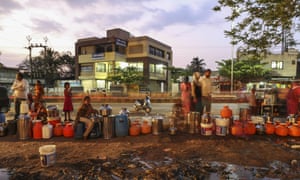11 ideas for urban water security in developing countries
Can we create water-secure cities or must populations adapt to a smaller and more erratic supply? Our panel of urban water experts have their say
1 | Retain water as a public good
Privatisation has been promoted globally for cities, but evidence shows that it often fails and the public sector is left to address the problems. Cochabamba in Bolivia is an iconic case: enormous public protests led to the cancellation of a private contract for the water utility. If water is a private commodity, then people are at the mercy of market logic. Instead, ensuring that the principle of the right to water is adopted will enable more comprehensive thinking that addresses the needs of the urban poor, as well as ecological sustainability.
Farhana Sultana, associate professor, Syracuse University’s Maxwell School,@Farhana_H2O
Farhana Sultana, associate professor, Syracuse University’s Maxwell School,@Farhana_H2O
2 | Diversify solutions
The important message to convey to those working in the sector and in urban planning is that one size does not fit all. Urban planners often aspire to develop fully networked and centralised water supply systems, but this might not be the right approach for every city – big or small – as infrastructure layout is influenced by geographical, political and social boundaries. It is a reflection of the city’s own history. Mariana Matoso, research officer, ODI, @marianamatoso
3 | Collaborate
The planning ministers and water ministers in most countries I’ve been to don’t speak to each other, so we need better integration with knowledge exchange and the creation of specific agencies. Adding water management to the training of the next generation of urban planners is also a way of ensuring that they start thinking more about waste and water issues.
Edoardo Borgomeo, senior editor, Global Water Forum, @GWFWater
Edoardo Borgomeo, senior editor, Global Water Forum, @GWFWater
4 | Recycle wastewater
Sewerage and sanitation – and how water and wastewater can be treated and reused – have to be part of any discussion around water security in cities. Recycling greywater, treating wastewater (or using it for other purposes, such as fish farming) and understanding the complete water system is absolutely essential to achieving urban water security.
Farhana Sultana
Farhana Sultana
5 | Legalise water vendors
In Maputo, Mozambique, the government and the water utility have worked together with small-scale private water providers towards expanding the utility’s network into the poorest areas of the city. These private operators, once illegal, were given formal status and training to ensure they provide a good quality service. This initiative was only possible because both sides recognised the potential of working together, but it’s important to ensure that governments remain the key regulators of this engagement.
Mariana Matoso
Mariana Matoso
6 | Connect informal settlements to the grid
A third to half of the populations in global south megacities are not connected to the water grid. The urban poor continue to pay much higher costs for water (often from water vendors) compared with wealthier neighborhoods that are on the grid. Informal water systems need to be part of the conversation, and affordable housing can enable these millions of people to become part of the city, have tenurial rights and be connected to the water grid.
Farhana Sultana
Farhana Sultana
7 | Promote water efficiency in agriculture
In some modelling work I’ve done with the University of Kassel, most of the urban water gap – the shortfall between projected demand and what people have access to now – could be closed by the agricultural sector getting more efficient with water use. The question is, what sets of incentives or policies can help make that actually happen?
Robert McDonald, lead scientist, The Nature Conservancy Global Cities programme,@RobIMcDonald
Robert McDonald, lead scientist, The Nature Conservancy Global Cities programme,@RobIMcDonald
8 | Understand affordability
You can look at the equity issue from multiple dimensions but in terms of affordability, Singapore is a unique example and has some interesting tariff structures and subsidies targeted at lower income households.
Edoardo Borgomeo
Edoardo Borgomeo
9 | Use smart technology
We are entering a time where cities, individuals and companies can incorporate new technologies that will ensure water security for the future. Cities can use low-cost sensors and software for optimising water use and detecting problems in systems, for example. We are seeing a number of interesting pilots and initiatives happening around the world with technologies that will continue to get cheaper.
Darlene Damm, principal faculty, Singularity University, @darlenedamm
Darlene Damm, principal faculty, Singularity University, @darlenedamm
10 | Create an open data platform for water
Sensors and modelling of quantity in water bodies is getting much better but there is still a big gap in knowing the human infrastructure – which water withdrawals are happening, where and when. I think the world needs something like an Open Water Map, where we pull together all the geospatial data on water withdrawals –particularly cross-watershed ones – into an easy, publicly-accessible form.
Robert McDonald
Robert McDonald
11 | Promote water justice
In the context of climate change and rapid global changes, we need to keep in mind what kinds of cities we want. To ensure water justice, communities can work with states and municipalities to manage and conserve water. The important thing is to ensure meaningful (not token) participation, take into account gender, class, and other social differences, and embrace social equity in planning and policies.
Farhana Sultana
Farhana Sultana

No comments:
Post a Comment